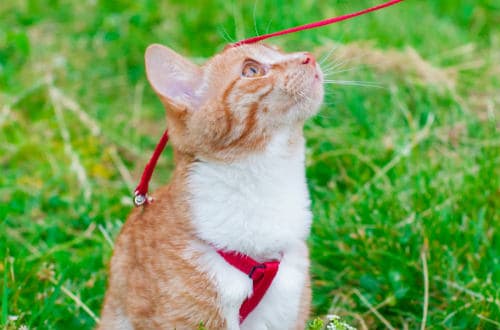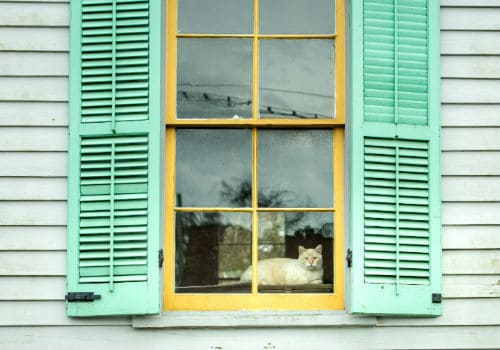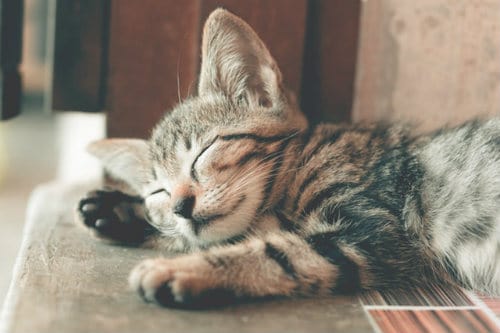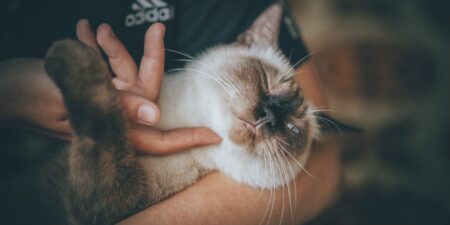For centuries, humans have cohabited with cats and dogs. But between cat and dog lovers, there’s no unanimous decision about which is better — the agile, elegant feline or the loyal, loving hound?
Both animals make great pets. Dogs provide a social aspect many families love, giving them a reason to go outside and exercise daily.
On the other hand, cats are smaller, cleaner, and quieter. They make perfect indoor companions or outdoor friends. They’re easier to care for, and their veterinarian bills are more affordable (in most circumstances).
Ultimately, there’s no clear winner between cats and dogs – everyone has their preference, and what one person loves about cats, another may not enjoy.
In this article, we’ll look at some of the characteristics that make cats excellent pets. We’ll talk about how they’re better than dogs and why some families might consider a feline friend instead of a clumsy puppy.
Let’s dive in.
#1. Cats Are (Usually) Smaller than Dogs
Okay – most people love a big dog. Hugging a St. Bernard after a long day is a great feeling, but caring for one can be overwhelming.
Cats are more practical if you live in a small house, condominium, or apartment. They’re much smaller and require less space – even the smallest dogs need more room than a large cat.
We aren’t saying you can’t have a dog in an apartment – in fact, many breeds love lounging on their favorite bed all day, soaking up sunshine through your window. But between playing, exercising, and their endless curiosity, dogs are happiest when they have room to roam.
[amazon bestseller=”cats tree”]
Unlike dogs, cats adapt well to small spaces and confined areas. Well-adjusted cats will thrive without much space if they have their essentials. If you have room for food and water bowls, litter boxes, and a scratching post, you have enough space for a cat.
Not to mention, cats won’t take up as much room on your furniture. After all, it sounds a lot easier to cuddle a kitty on your bed than a 100lb Golden Retriever!
#2. Cats Are Less Expensive Than Dogs

When we say cats are less expensive than dogs, we mean all-around – the adoption fees, food costs, and veterinary bills are all cheaper than the same fees for dogs, on average.
For example, many animal shelters post $100+ adoption fees on adult dogs and even higher fees for puppies. On the other hand, most cats are available to adopt for $75 or less – even kittens.
Some shelters host free adoption days for cats or offer discounts for certain holidays. This is less common for dogs – it costs more for shelters to rehabilitate dogs, so their adoption fees are less affordable.
This makes cats an excellent pet for college students and retirees on a fixed income. And once you adopt a pet, the savings will compound over their lifetime. In fact, the ASPCA says cat owners could save a minimum of $300 to $800 each year by choosing a feline friend over a puppy!
In most pet stores, cat food is cheaper than dog food – even for premium brands. The cost per ounce is less expensive you don’t need to buy food as often. A 15lb bag of dog food will last an English Bulldog two weeks maximum, but the same bag will feed a medium-sized cat for more than six weeks.
Veterinarian fees for cats a usually more affordable for cats than dogs, depending on your reason for visiting. For example, it’s cheaper to spay a cat than a dog in most parts of the world (if you can’t get your cat spayed for free at a local clinic).
Shots, prescriptions, and medical examinations are all cheaper for cats than dogs. The same applies to toys, beds, and nearly any pet supplies you need – not to mention, cats require fewer supplies in general (which we’ll discuss below).
Living in an apartment with a cat is cheaper, too. Apartments may charge a lower monthly pet fee or pet deposit if you’re moving in with a cat instead of a dog.
#3. You Don’t Need as Many Supplies or Training for Cats

Adopting any kind of pet is a lot of responsibility – especially a dog. Dogs require leashes, collars, kennels, large beds, training treats, harnesses, grooming supplies, and more to sustain.
When you adopt a cat, all you need is a food dish, a water bowl, and a litter box (with food and litter, of course). Naturally, you should buy toys and grooming supplies too, but cats have fewer bare-minimum requirements for supplies than dogs.
[amazon bestseller=”cats litter” items=”1″ filterby=”title” filter=”litter” title_length=”255″ description_length=”255″ description_items=”255″ orderby=”rating”]
And unlike dogs, cats don’t require training. Sure – you need to teach your kitten to use a litter box and stay off of your counters, but you don’t need to teach him commands like sit, stay, and lay down.
You don’t have to pay for training lessons, and you don’t need a kennel for crate training. Because cats don’t need walks, you don’t need to teach yours to heel and steer clear of cars.
This saves you time, money, and frustration. Training a dog can be a fun, rewarding experience but costly, challenging, and time-consuming for many families. With cats, you can avoid the hassle.
#4. It’s Easier to Rent with Cats

If you’re renting an apartment, townhouse, or condo, it’s a lot easier to move in with cats than dogs. Cats are significantly less likely to damage property than dogs – as such, most rental management companies prefer leasing to people with cats than dog owners.
Many places are cat-friendly but won’t allow dogs. If they allow dogs, you may pay an additional pet deposit and monthly rental fee – especially if you have large dogs.
And most apartment buildings don’t have weight limits or breed restrictions for cats (common stipulations for dog owners). If you have a Pit Bull or a Mastiff, there’s a good chance management will deny your rental application.
This doesn’t apply to cats – you’ll never see lease clauses limiting cats to under 30 lbs or banning certain breeds. As long as you find a pet-friendly location, you can move in with your cat regardless of its characteristics.
#5. Cats Are Easier to Sustain While You Travel

Traveling is one of the hardest parts of dog ownership. Finding a sitter or boarding agency, you trust is challenging enough – affording the high rates is another concern.
Dogs require more direct care and attention daily than cats. If you leave for longer than 8 hours, you need someone to take your dogs outside to relieve themselves. They need attention so they don’t feel lonely and need walks to expend energy.
On the other hand, cats require less daily interaction. Yes – you should clean your litter box and play with your cat every day. But if you take a weekend trip out of town, your cat will be fine alone – if they can self-feed, it’s as easy as leaving out enough food to get by and laying fresh litter.
When you go on longer trips, paying for care is less expensive for cats than dogs. Usually, you need to board your dog off-site or pay someone to stay in your home and care for him or her.
It’s much easier to arrange care for cats – someone can stop by your house a few times a day, you can board them with an agency, or someone can bring them to their home. You have many options, giving you peace of mind about your pet while you travel.
#6. Cats Aren’t a Liability
How often do you hear stories about cats biting someone and causing a lawsuit? It’s not common – more lawsuits involve wrongful deaths and injuries for cats than cat bites.
In fact, dog bites are the most common type of animal-related injury in the United States, according to the Center for Disease Control’s 2009 statistics.
The same report estimated more than 800,000 dog bites each year require medical attention, 31 of which are fatal.
The Centers for Disease Control doesn’t have statistics about serious cat bites and cat-related fatalities for 2009. The numbers are statistically insignificant, compared to dogs.
When you adopt a dog, you need to accept these risks.
You may be liable for their medical bills if your dog bites someone. Depending on the injury, you could also be responsible for other damages.
This isn’t as likely with cats – sure, your cat could bite someone, but the likelihood of it requiring medical attention is minuscule.
With cats, you can feel secure when guests come to your house, knowing they won’t attack strangers or send someone to the hospital.
#7. Cats Are Quieter Than Dogs

Don’t get us wrong – some cats can be noisy. They’ll meow when they’re hungry, thirsty, or bored. Some will purr a lot, and others enjoy playing with loud toys (like balls with bells). But comparatively speaking, dogs are much louder.
Cat meows aren’t loud and intrusive like barking and growling. They won’t wake you up in the middle of the night with their noises or bother your neighbors. If you’re looking for a pet who won’t distract by unnecessary noise, a cat may be a better fit than a dog.
#8. Cats Require Less Time
Adopting a dog is a huge time commitment. You need at least an hour every day to walk, play, feed, and cuddle your dog – more if you have a large or active breed!
Don’t get us wrong – cats are a time commitment, too. If you don’t have a lot of time outside of work or school, be sure you have enough to cover the basics if you adopt a cat.
On the other hand, you don’t need to walk a cat or do a daily training session. You can if you choose, but ultimately, your cat will be fine with food, water, and clean litter.
And cats don’t require active attention like dogs. Many cats are more than happy to lay on your lap and cuddle with you while you watch television. If they want to play while you’re busy, they’ll self-entertain.
#9. Cats Don’t Slobber
Every so often, you’ll meet a cat who drools. Usually, he or she does this when they’re hungry or relaxed. But if you’ve seen it, you know it doesn’t compare to most dogs!
According to a study by Princeton University and the Massachusetts Institute of Technology, cats are significantly better at drinking water than dogs.
When dogs drink water, they slam their tongues into the water with up to eight times the force of gravity. This causes splashing, leaving a mess of water and drool everywhere.
Couple their poor drinking skills with the floppy, thick jowls that characterize many dog breeds (we’re looking at you, Mastiffs and Bulldogs!), and cleaning up slobber is a daily task for a lot of dog owners.
Cats are the complete opposite in this regard – they drink their water delicately, using up to twice the force of gravity to drink water. They’re far neater while they drink, giving you less mess to clean.
[amazon bestseller=”cats water fountain”]
#10. Cats Require Fewer Baths
Dogs produce a lot of oil from their skill. They’re less effective at removing it while they wash themselves than cats are so they require additional grooming to stay clean.
If you don’t bathe your dog often enough, he may start to smell, feel oily, or shed excessively. But bathing your dog is a big undertaking that takes a lot of time and energy.
Cats rarely require baths. Cleaning themselves is one of their most basic natural instincts. They remove dirt and excess hair from their coat with convenient papillae-coated tongues that make grooming a smaller hassle for you.
[amazon bestseller=”cat bath shampoo”]
Final Thoughts

We get it – dogs make excellent pets. They’re loyal, love to play, and can learn fun tricks.
On the other hand, cats are great pets in their own right. They’ll give you space when you need it, are more affordable, and are more well-suited for apartment life.
If you’re deciding between a cat or a dog for a pet, think about what you’re looking for. Are you looking for an ongoing, daily commitment or a low-maintenance companion? Ultimately, cats and dogs each have unique advantages, but cats may be a better option if you’re looking for a quiet, clean addition to your family.
Why Cats Are Better (Video)
Related Questions
#1. Can cats and dogs live together peacefully?
Yes, cats and dogs can live together harmoniously if introduced and socialized correctly. Consider each animal’s personality, age, and background when introducing them. Gradual introductions, positive reinforcement, and creating a comfortable environment for both pets can significantly increase the likelihood of a successful cohabitation.
#2. How can I keep my cat entertained while I’m away?
To keep your cat entertained during your absence, provide a variety of stimulating toys and activities. Puzzle toys, scratching posts, and window perches are excellent options. Additionally, consider using an automatic feeder and a water fountain to maintain their routine and ensure they have access to fresh food and water.
#3. What can I do to help my cat adjust to a new home?
Creating a safe, comfortable space is crucial when introducing your cat to a new home. Set up a designated “safe room” with their essentials, such as food, water, litter box, and familiar items like toys and bedding. Gradually introduce them to the rest of the house and allow them to explore at their own pace. Be patient and provide positive reinforcement to help them acclimate to their new environment.
#4. How can I help my cat and dog get along?
To help your cat and dog get along, take the time to introduce them slowly and under controlled circumstances. Monitor their interactions, especially in the beginning, to prevent conflicts or misunderstandings. Encourage positive interactions by rewarding both pets for calm behavior, and give them their own spaces to retreat to when needed. Over time, they will likely become more comfortable with each other.
#5. What are some common health issues in cats, and how can I prevent them?
Common health issues in cats include dental problems, obesity, urinary tract infections, and kidney disease. To prevent these issues, maintain a routine veterinary care schedule, provide a balanced diet, and ensure your cat has plenty of exercise and mental stimulation opportunities. Regular grooming and dental care can also contribute to your cat’s overall well-being.
"In ancient times cats were worshipped as gods; they have not forgotten this."
-- Terry Pratchett





